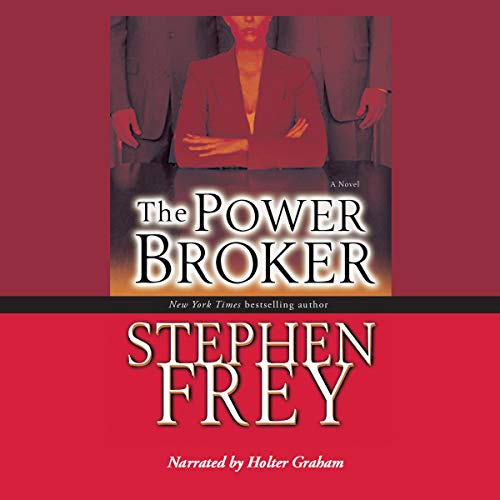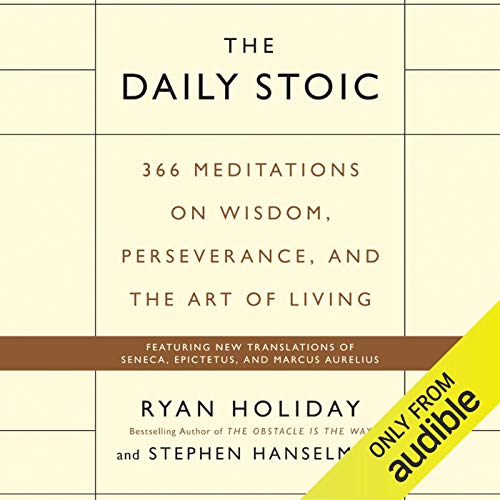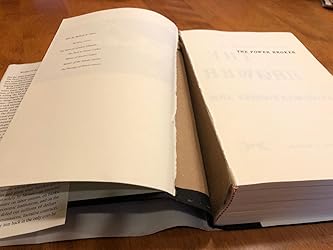
 Audible sample
Audible sample  Playing...
Playing... 
 Paused
Paused  Your audiobook is waiting!
Your audiobook is waiting!
Enjoy a free trial on us
$0.00$0.00
- Click above for unlimited listening to select audiobooks, Audible Originals, and podcasts.
- One credit a month to pick any title from our entire premium selection — yours to keep (you'll use your first credit now).
- You will get an email reminder before your trial ends.
- $14.95$14.95 a month after 30 days. Cancel online anytime.
Buy
-13% $47.25$47.25
The Power Broker: Robert Moses and the Fall of New York
 Audible Audiobook
– Unabridged
Audible Audiobook
– Unabridged
PULITZER PRIZE WINNER A modern American classic, this huge and galvanizing biography of Robert Moses reveals not only the saga of one man’s incredible accumulation of power but the story of his shaping (and mis-shaping of twentieth-century New York. One of the Modern Library’s hundred greatest books of the twentieth century.
Robert Caro's monumental book makes public what few outsiders knew: that Robert Moses was the single most powerful man of his time in the City and in the State of New York. And in telling the Moses story, Caro both opens up to an unprecedented degree the way in which politics really happens—the way things really get done in America's City Halls and Statehouses—and brings to light a bonanza of vital information about such national figures as Alfred E. Smith and Franklin D. Roosevelt (and the genesis of their blood feud), about Fiorello La Guardia, John V. Lindsay and Nelson Rockefeller.
But The Power Broker is first and foremost a brilliant multidimensional portrait of a man—an extraordinary man who, denied power within the normal framework of the democratic process, stepped outside that framework to grasp power sufficient to shape a great city and to hold sway over the very texture of millions of lives. We see how Moses began: the handsome, intellectual young heir to the world of Our Crowd, an idealist. How, rebuffed by the entrenched political establishment, he fought for the power to accomplish his ideals. How he first created a miraculous flowering of parks and parkways, playlands and beaches—and then ultimately brought down on the city the smog-choked aridity of our urban landscape, the endless miles of (never sufficient) highway, the hopeless sprawl of Long Island, the massive failures of public housing, and countless other barriers to humane living. How, inevitably, the accumulation of power became an end in itself.
Moses built an empire and lived like an emperor. He was held in fear—his dossiers could disgorge the dark secret of anyone who opposed him. He was, he claimed, above politics, above deals; and through decade after decade, the newspapers and the public believed. Meanwhile, he was developing his public authorities into a fourth branch of government known as "Triborough"—a government whose records were closed to the public, whose policies and plans were decided not by voters or elected officials but solely by Moses—an immense economic force directing pressure on labor unions, on banks, on all the city's political and economic institutions, and on the press, and on the Church. He doled out millions of dollars' worth of legal fees, insurance commissions, lucrative contracts on the basis of who could best pay him back in the only coin he coveted: power. He dominated the politics and politicians of his time—without ever having been elected to any office. He was, in essence, above our democratic system.
Robert Moses held power in the state for 44 years, through the governorships of Smith, Roosevelt, Lehman, Dewey, Harriman and Rockefeller, and in the city for 34 years, through the mayoralties of La Guardia, O'Dwyer, Impellitteri, Wagner and Lindsay, He personally conceived and carried through public works costing 27 billion dollars—he was undoubtedly America's greatest builder.
This is how he built and dominated New York—before, finally, he was stripped of his reputation (by the press) and his power (by Nelson Rockefeller). But his work, and his will, had been done.
- Listening Length66 hours and 9 minutes
- Audible release dateMay 20, 2011
- LanguageEnglish
- ASINB0051X6ZQ4
- VersionUnabridged
- Program TypeAudiobook
People who viewed this also viewed
- Audible Audiobook
- Audible Audiobook
- Audible Audiobook
- Audible Audiobook
- Audible Audiobook
People who bought this also bought
- Audible Audiobook
- Audible Audiobook
- Audible Audiobook
- Audible Audiobook
- Audible Audiobook
Related to this topic
- Audible Audiobook
- Audible Audiobook
- Audible Audiobook
- Audible Audiobook
- Audible Audiobook
Product details
| Listening Length | 66 hours and 9 minutes |
|---|---|
| Author | Robert A. Caro |
| Narrator | Robertson Dean |
| Audible.com Release Date | May 20, 2011 |
| Publisher | Random House Audio |
| Program Type | Audiobook |
| Version | Unabridged |
| Language | English |
| ASIN | B0051X6ZQ4 |
| Best Sellers Rank | #1,794 in Audible Books & Originals (See Top 100 in Audible Books & Originals) #9 in Biographies of Business Leaders #10 in Historical Biographies (Audible Books & Originals) #16 in Biographies of Politicians |
Customer reviews
Customer Reviews, including Product Star Ratings help customers to learn more about the product and decide whether it is the right product for them.
To calculate the overall star rating and percentage breakdown by star, we don’t use a simple average. Instead, our system considers things like how recent a review is and if the reviewer bought the item on Amazon. It also analyzed reviews to verify trustworthiness.
Learn more how customers reviews work on AmazonReviews with images
-
Top reviews
Top reviews from the United States
There was a problem filtering reviews right now. Please try again later.
Essentially, for 40+ years Robert Moses was the most powerful man in the entire state of New York. A large portion of his power was derived from his chairmanship of the Triborough Bridge Authority. Typically, a public authority shuts down after its bonds have been repaid and its construction projects have been finished. But Moses, called by Caro "the best bill drafter in Albany," set up the Authority in a way that allowed him to continually issue bonds year after year after year. And since the Constitution states that "No states shall...impair the obligations of contracts," no one could do anything about it. Triborough became a small empire for Moses...at its homebase on Randall's Island, the TBA was the supreme law of the land, and it was enforced by some 200 TBA police officers. Moses often used them to escort his big limousine around NYC and Long Island.
One big factor in Moses' power was the press. For four decades he maintained the image of a totally non-political and selfless public servant (he famously refused to take a salary for most of his positions). The sometimes-willful ignorance of the press to Moses' abuses of power is amazing to read. Caro painstakingly documents so many of them.
His genius and his impact are absolutely inimitable. Name a major bridge, parkway, expressway, thruway, park, or beach in the New York metropolitan area, Long Island, or New York State, and the MAJORITY of them will have been built by Robert Moses. This was a guy who almost never slept, who swam out into the middle of the ocean alone when he was in his 80s, who fell into absolutely horrifying bouts of rage when someone dared to disagree with him. He may have been one of the greatest abusers of power in recent history but, as Caro says, he "Got Things Done."
I loved reading about the absolute control he exercised over various New York mayors, governors, and other officials. He would routinely ignore requests to meet with mayors; if they wanted to meet with Moses, they had to come to him. Every time a new mayor was sworn in, Moses would grab the slips on which mayoral appointments were written and write his own name and position on them. The mayor would then meekly sign it, knowing that he couldn't possibly deny Moses any of those positions.
I could say so much more but the other reviewers have already covered the book's strengths. I'll end with this: Moses was one of the most fascinating politicians in the history of this country. But so many have already forgotten him. I hope people will read this book to learn not only about Moses, bu about New York, Washington, and most importantly the use of political power in this country.
Caro succeeds so well because of his eye for detail. Robert Moses' accomplishments are discussed in the book's prologue, and we spend the next 1,200 pages or so learning all about them in detail. We get to know Moses as a headstrong young man, coming into his intelligence more and more and using it to make everyone in his path do his bidding. He gets menial employment after college, forsaking money due to his affluent background, but sticks to his principles in a time of great change in New York City. Eventually those go out the door as Moses starts amassing his power, through overpowering Albany with his rapaciousness and brilliant alliances, and the legend grows from there until he is one of the most powerful men in the United States. We learn about major players like Alfred E. Smith, LaGuardia, and FDR in a behind-the-curtain way that makes you second guess their public images. We learn about Moses' talents in bill writing, and how he used it to get pretty much whatever he wanted out of the state and federal governments. We learn of how he was able to build the West Side Highway, Jones Beach, and the Cross-Bronx Expressway, but his downfall began over a small patch of land in Central Park. We learn about Moses' disdain for the public, and his desire to create bridges and parks to satisfy his own ego rather than anything for the public good.
Any review cannot properly encapsulate Moses' achievements, their impact and how he went about making them, the tactics he employed, the people he ruined, the money he squandered, the lies he told, the decades of toil, the Herculean strength and brutishness he repressed everyone with, and in short the countless choices he and he alone made that forever changed New York City and its surrounding areas, but it is all here for you to experience. This is all written in a prose that is professional yet compulsively readable- you're going to miss this book once you've finished it. It is a testament to the wayward politics of the early twentieth century, the genius and madness of Robert Moses, as well as the incomparable talents of Mr Caro that raise this biography of reportage to art. Any knowledge whatsoever of Robert Moses isn't necessary to enjoy this book. Read it if you like biography. Read it if you like New York. Read it if you've ever heard of New York. This is a stunning achievement.
Top reviews from other countries
Reviewed in Sweden on June 5, 2023

On 27th October, 2015, Robert A. Caro made a rare appearance onstage at London in a talk moderated by William Hague. In his talk Mr. Caro talked about all the dynamics of power working in civilised democratic societies. Mr. William Hague was very much correct in suggesting the publishers to publish the original work on Robert Moses comprising about 1 mn 50 k words. Readers of the works of Mr. Caro must join together their voices for publication of the original and uncut version of "The Power Broker" as a collector's edition. At least now, the publishers can rest assured of the commercial success of the original unabridged book. It's my earnest request. Mr. Hague may certainly chose to lead our voices.



























